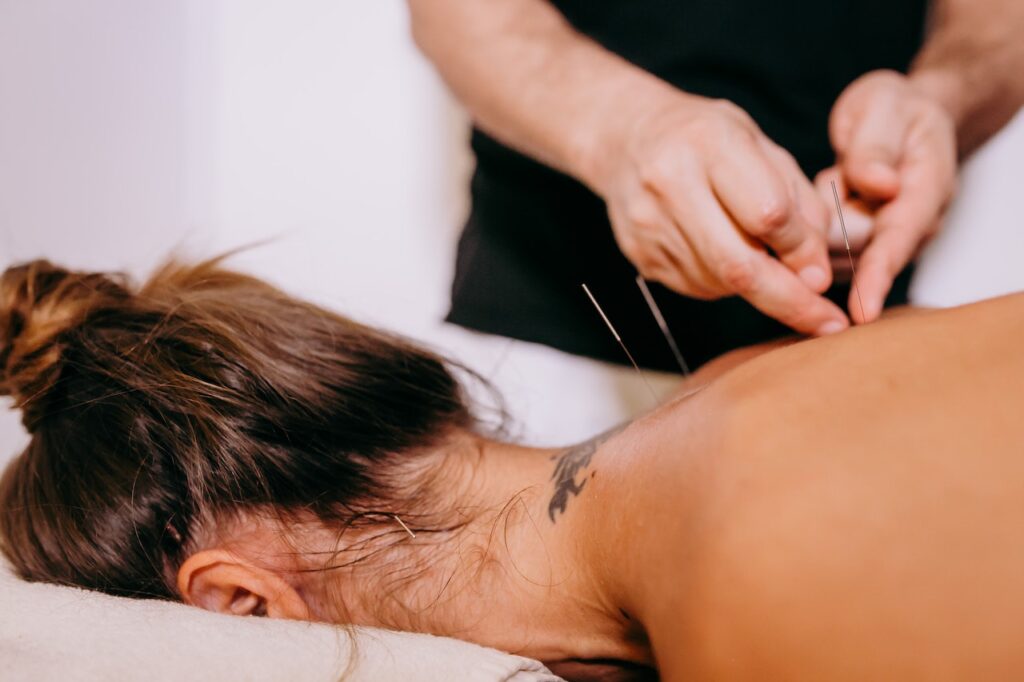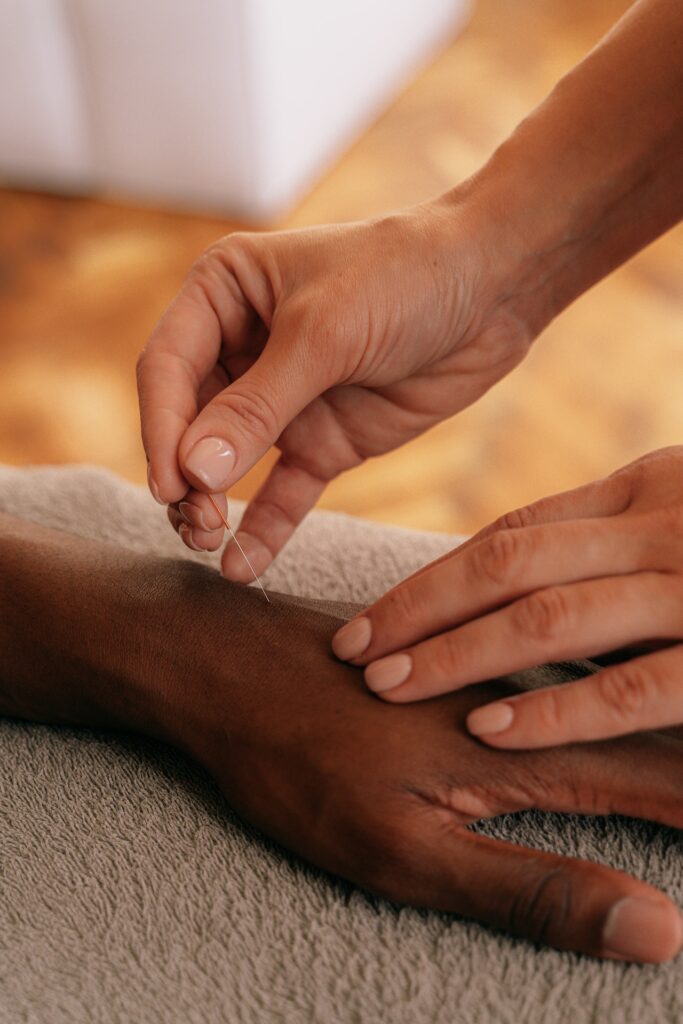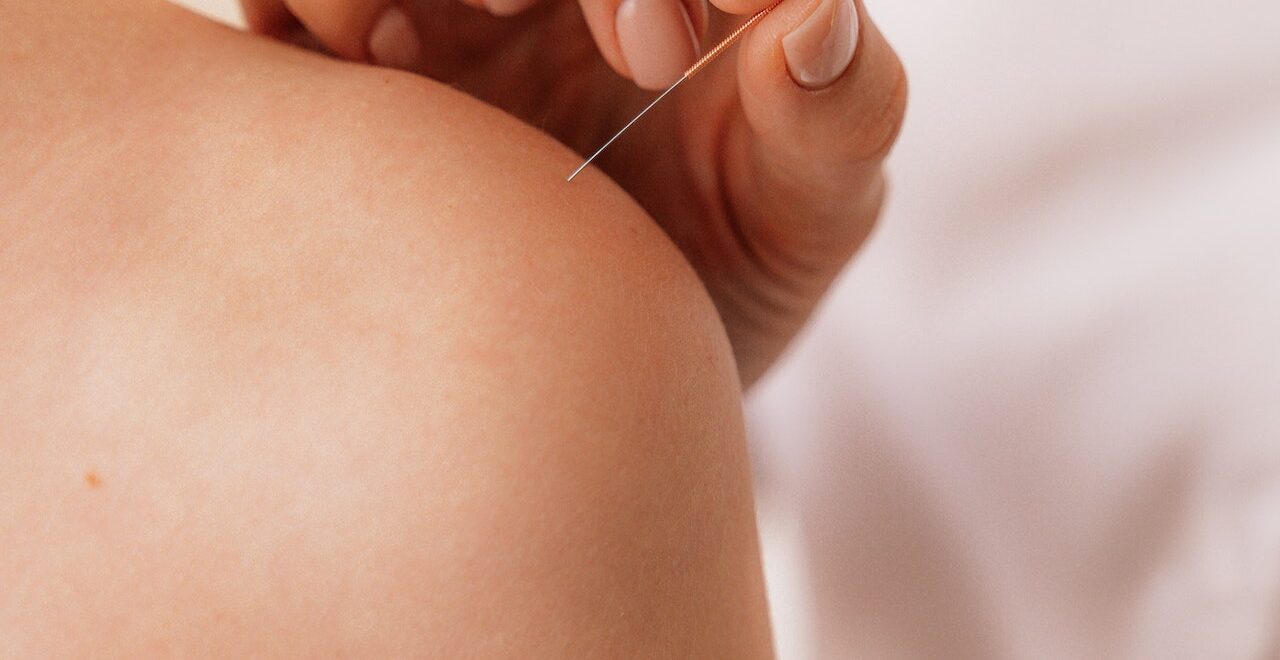Acupuncture has been around for 3,000 years. But until recently, this ancient practice was considered fringe. Well, times have changed. Acupuncture’s popularity has boomed – with more than 10 million acupuncture treatments done each year in the US alone.
Thanks to a growing body of research, acupuncture is recognized as a safe and effective treatment, even at prestigious medical centers. Acupuncture is commonly used to treat chronic pain. But it’s also used for insomnia, allergies, anxiety, and a slew of other health issues.
So if you’re curious about acupuncture but aren’t sure if it’s a good fit for you, read on. In this article, we’ll cover all your burning questions about this technique, along with seven benefits of acupuncture.
What is Acupuncture?
Acupuncture is a treatment that involves placing thin, stainless-steel needles into specific points in the body.
Part of traditional Chinese medicine (TCM), acupuncture’s aim is to promote the flow of qi, or chi (pronounced ‘chee’), your body’s vital life force. According to TCM, true health stems from how freely qi flows through your body’s 14 energetic meridians.
If these energetic pathways become blocked, symptoms may appear. Over time, these imbalances may lead to disease.
Enter acupuncture. Acupuncture practitioners insert needles into targeted spots along these meridians (known as acupoints). This helps promote energy flow.
There are over 350 acupoints, each one having a related organ or organ system. As qi flows more freely through these pathways, balance is restored. This may ease symptoms – or even make them disappear altogether.

How Does Acupuncture Work?
It’s not entirely understood. Some studies using MRI suggest acupuncture causes changes in the central nervous system. It’s believed these changes may affect pain processing and increase blood flow to certain areas of the body.
Other theories say stimulation from the needles influences inflammatory markers, causing hormonal changes. Others believe acupuncture affects the connective tissues, which enhances the immune system.
For now, the mechanisms behind acupuncture’s benefits are unclear. While a mystery, research shows acupuncture is an effective treatment for a myriad of health conditions.
7 Health Benefits of Acupuncture
Before we dive into the benefits, know that acupuncture research is still in its infancy. So this list is certainly not exhaustive.
That said, based on the research, here are a few health benefits of acupuncture:
Relieves pain
More than 1 in 4 Americans suffer from chronic pain. If you’re one of them, you know how debilitating it is to live in pain. Thankfully, acupuncture may help.
One study found acupuncture was effective at relieving low back, neck, and shoulder pain, as well as knee pain from osteoarthritis. Even more impressive, these pain-relieving benefits persisted for 12 months. Other research echoes this.
The American College of Physicians even includes acupuncture as a first-line non-drug treatment for people with chronic low back pain.
And while being poked with needles may not be your idea of a good time, it’s a far safer option than prescription painkillers.

Reduces headaches & migraines
If you’re plagued by chronic headaches, you may want to give acupuncture a try. Research shows acupuncture reduces the frequency of tension headaches. But these benefits hold true for migraines too.
One 2020 review compared acupuncture’s effectiveness to migraine medications. They found acupuncture reduced the frequency and intensity of migraine pain. And unlike medications, there were no adverse effects.
Eases stress & anxiety
If you’re stressed out, acupuncture may help you unwind. Research shows acupuncture increases heart rate variability (HRV).
HRV is a measure that reflects the balance of your nervous system. People with a higher HRV tend to be more resilient to stress. Those with a lower HRV are more likely to be sympathetic dominant – meaning their ‘fight or flight’ response is running the show.
Acupuncture may even help those with anxiety disorders. One study found acupuncture reduced anxiety in people who hadn’t responded to other treatments like therapy and medication.
Improves sleep
Struggle with sleep? Acupuncture may help. It’s said to help the body shift from a sympathetic ‘fight or flight’ state to a calm parasympathetic state. This may, in turn, help you sleep better.
Research shows acupuncture helps people with insomnia sleep longer. Often, these improvements are better than sleep medications, but without the nasty side effects.
This may be because acupuncture increases serotonin and GABA, two calming neurotransmitters. Your body converts serotonin into the sleep hormone melatonin, which may help you snooze more soundly.
Lowers blood pressure
High blood pressure, also known as hypertension, affects more than one billion people worldwide. This is scary news, as hypertension increases the risk of stroke and heart disease.
Changing your diet and lifestyle is crucial to lowering blood pressure. But if you need extra help, and want to avoid taking medications, acupuncture may offer relief.
Research shows acupuncture is an effective treatment for lowering pressure. This is true whether patients did acupuncture alone, or used it in combination with medications.
Reduces allergies & asthma
If “hay fever” hits you hard, you may want to try acupuncture. One 2015 study found acupuncture reduced nasal symptoms and lowered IgE, an antibody related to allergies. Plus, patients who had acupuncture treatments used fewer allergy medications than those who didn’t.
Acupuncture is also shown to help allergic asthma, a type of asthma triggered by allergens like dust, pollen, and mold. In one study, patients who had 15 acupuncture treatments over three months had fewer asthma symptoms and greater quality of life than those who only had routine care.
Eases menstrual cramps
For many women, painful periods can make them dread that time of the month. If you’re one of them, instead of reaching for an Advil, you may want to book an acupuncture session.
One scientific review found acupuncture reduced menstrual cramps better than non-steroidal anti-inflammatory drugs (NSAIDs).
What to Expect During an Acupuncture Treatment

Before a treatment, your acupuncturist will ask you about your symptoms and lifestyle. They’ll then perform a brief physical exam and ask you to lie down.
Your acupuncture practitioner will then insert needles into strategic points on your body. Most treatments use 5-20 needles, depending on the health issue.
You’ll then relax with the needles in place for 10-20 minutes. Your practitioner will check in on you and may spin, move, or heat the needles to activate more chi. Many people report feeling relaxed after a treatment, while others feel energized.
Do Acupuncture Treatments Hurt?
Acupuncture is meant to help – not hurt! Since needles are hair-thin, needle placement is often painless. Some people feel a mild aching or pinching sensation when a needle hits a certain depth. But any discomfort is mild and short-lived.
If you get an acupuncture treatment and feel pain, it’s usually due to improper placement of the needles. That’s why it’s crucial to choose a qualified acupuncture practitioner.
Are There Any Risks?
As long as you get treatment from a certified acupuncture practitioner, the risks are slim. The FDA regulates acupuncture needles, so single-use, disposable needles are the norm. Needles must be sterile, steel, nontoxic, properly labeled, and only used by qualified practitioners.
While acupuncture can help a variety of health conditions, it’s not a good fit for everyone. Acupuncture isn’t recommended if you have an active infection, or:
- Have a pacemaker. Some forms of acupuncture apply mild electrical pulses to the needles. This may interfere with how your pacemaker works.
- Have a bleeding disorder. This may lead to bleeding or bruising at the needle sites.
- Are pregnant. Some acupoints are believed to stimulate labor.
How Many Acupuncture Treatments Do You Need?
It depends on the health condition and severity of your symptoms. Some people get profound relief from a single treatment. Others may need 4-8 treatments to restore balance.
The effects are cumulative, meaning the more treatments you get, the more benefits you’ll feel.
What Other Treatments Complement Acupuncture?
Acupuncture is powerful on its own. However, blending it with other holistic treatments may enhance benefits.
If chronic pain is the issue, chiropractic care may offer added relief. Chiropractors provide hands-on adjustments to get the spine in proper alignment. This may help reduce pain and promote further healing.
If stress, anxiety, or insomnia are the culprits, massage therapy may help your body and mind unwind.
And if you have gut issues or symptoms of hormonal imbalance, functional medicine and acupuncture make a good combo. Functional medicine is a holistic approach to healthcare that helps uncover the root cause of your symptoms.
Ready to Feel Better? Try Acupuncture in Orland Park, IL
Tired of struggling with stubborn symptoms and wonder if acupuncture may help? We’re here for you. At Anchored in Health, we’re proud to offer acupuncture. Our certified acupuncture practitioner has over 20 years of experience, treating a wide range of health issues.
So if you live in the greater Chicago area, and are ready to feel firsthand how acupuncture can transform your health, follow these steps:
- Contact us with questions.
- Book your first acupuncture treatment here.
- Discover how acupuncture can relieve your symptoms and improve your well-being.
Other Holistic Health Services Offered at Anchored in Health in Orland Park, IL
At Anchored in Health, we offer a variety of alternative health services to help you feel your best, including massage therapy, chiropractic care, and functional medicine. We also offer thermography, genetic testing, and the Shape Reclaimed program.
Live in the Chicago area? Contact us to find out how we can help you live your healthiest life.
Disclaimer: The information provided on this blog is for educational and informational purposes only and is not intended to diagnose, treat, cure, or prevent any disease. The content is not a substitute for professional medical advice, diagnosis, or treatment. Always seek the guidance of a qualified healthcare provider with any questions you may have regarding your health or a medical condition.
Reading this blog does not establish a doctor-patient relationship between you and Anchored In Health or any of its practitioners. Reliance on any information provided in this blog is solely at your own risk. For medical concerns, always consult a licensed healthcare provider.
References
- https://www.ncbi.nlm.nih.gov/pmc/articles/PMC4104560/
- https://www.ncbi.nlm.nih.gov/pmc/articles/PMC4104560/
- https://www.ncbi.nlm.nih.gov/books/NBK553030/
- https://www.ncbi.nlm.nih.gov/pmc/articles/PMC5393924/
- https://www.ncbi.nlm.nih.gov/pmc/articles/PMC3658605/
- https://www.ncbi.nlm.nih.gov/pmc/articles/PMC7773012/
- https://www.ncbi.nlm.nih.gov/pmc/articles/PMC4203477/
- https://pubmed.ncbi.nlm.nih.gov/25595195/
- https://www.ncbi.nlm.nih.gov/pmc/articles/PMC3156618/
- https://www.ncbi.nlm.nih.gov/pmc/articles/PMC7998524/
- https://www.ncbi.nlm.nih.gov/pmc/articles/PMC7894028/
- https://www.frontiersin.org/articles/10.3389/fnagi.2020.00138/full
- https://www.ncbi.nlm.nih.gov/pmc/articles/PMC5999465/
- https://pubmed.ncbi.nlm.nih.gov/25590322/
- https://www.liebertpub.com/doi/10.1089/acm.2016.0357
